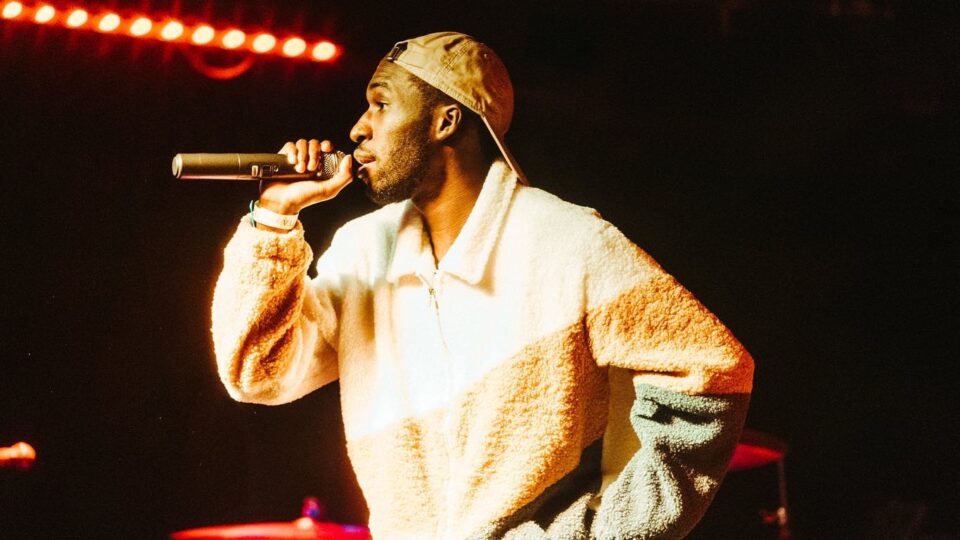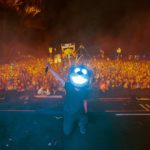Ahzia Hester brought heat to Gabe’s on Friday evening, opening his concert with Someone, Somewhere off of his 2021 LP, Welcome to Nowhere. The moment the track’s smooth piano started, the audience perked up and prepared themselves to be taken to Nowhere.
He performed both new songs and songs from his 2019 EP, READY.SET.GO, and even brought it back with Barz On Barz from his first Soundcloud EP, Abstract.
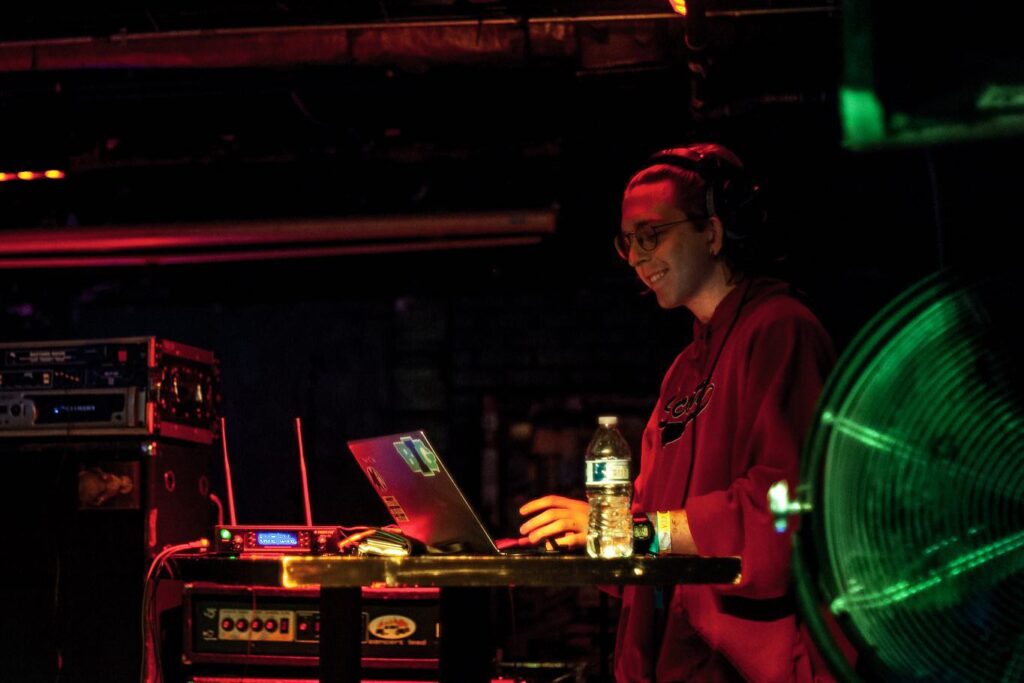
Accompanying Ahzia on stage was Scott Griffin, a fellow music-maker from Iowa City. Throughout the set Ahzia performed to a backtrack and the only difference that I noticed between the show’s instrumentals and the studio instrumentals was the amount of bass added. The music was sometimes heavy with the low frequencies, which I quite liked because it added a lot of space and impact to the songs.
Along with the boosted instrumentals, the energy in the room was also amplified by dedicated friends and fans shouting key lyrics. I was dancing non-stop, in spite of the small venue, having fun and getting myself moving.
The concert totaled around thirty minutes and songs played back to back with little pause in between. Ahzia was ready for the streamlined set and he was clearly rehearsed; his rapping was fluent, he was in the zone, and he looked comfortable on stage. I wish there was more time for crowd interaction, but because Mission Creek is a tightly run music festival with artists performing at the same venues right after one another, I’ll have to hold out for a future Ahzia show.
At the conclusion of the set, the audience demanded an encore, so Ahzia ended the night with his song, DRIVE. This incited a five person mosh pit and moments like these prove the effectiveness of repeating, one line choruses.
After the show, he was gracious enough to indulge me for a forty-five minute interview, transcribed below.

This interview has been edited for clarity
Marissa: First of all, I’d like to say I really enjoyed the show.
Ahzia: Thank you.
Marissa: Yeah, I had a lot of fun. So if you could only play one song from this new album at this performance tonight, what would it be? Is there any song that’s most special to you or your favorite?
Ahzia: I really like Mighty Fine. I just like the groove. I like the tempo. I like the way I was flowing on it. I also noticed surprisingly, Night Owl seems to be the one that kind of elicits something out of people. But I also like The Wav.. Those are probably my top three.
Marissa: Yeah, that [last] one’s my favorite.
Ahzia: Yeah, it’s got like a real kind of dancey element to it. The beat switches. I think I saw you shout that one out on the [KRUI Promo post for my show]. You were so spot on with what music artists you used to describe me. You’re like, “If you like this artist- if you like Gambino, Kanye, and Pharrell…” And I’m like, “Those are literally, like, my dads!” Like those are the dudes that have shaped me. So much.
Marissa: Yeah, yeah. So are there any like songs from Welcome to Nowhere that you’re lyrically most proud of?
Ahzia: Wow. I really like the the outro of Someone, Somewhere.
Ahzia: I feel like that almost serves as a nice synopsis for what the whole tape is about and to close in on that, certain lines regarding- as we know, we live in Iowa and I think sometimes that it’s very easy to act like this isn’t a real place because there are certainly flashier locations in the U.S. But at the end of the day, this is where I grew up. [Iowans] are the kind of the people that have informed the stuff I do and inspired me. So the whole point of the titles, like Welcome to Nowhere– it’s kind of cheeky. You know, it’s like, “Welcome to nowhere,” ’cause we feel like we’re in the middle of nowhere! You know what I mean? We’re like a flyover state. But yeah, I mean, you got to own it.
Marissa: Yeah. I’m not an Iowa-native, so my experience of Iowa is limited to Iowa City. So when did you last listen to Welcome to Nowhere in its entirety?
Ahzia: Uh, probably a week going into the festival. Because I was moving songs around up until the last minute. I was thinking in my head, “There’s gonna be people that will come that probably have been to previous shows, but what if someone never had heard me? And this is the first time, and they’re like, ‘Who’s this Ahzia dude? Let’s just go check this show out; some dude rapping here.'” So I try to be very particular about the ones- most of them made it tonight. I mean, there’s only a couple that I didn’t play.
Marissa: Yeah. So do you think your relationship to these songs has changed since the album’s release?Like, has there been any like influence from the fans’ reactions to how you think about these songs?
Ahzia: Oh, yeah, I mean, that’s one of those funny things I think every artist can speak to. You feel good about it when you make it. And then it comes time: you probably hate it a little bit ’cause you’ve heard it so many times. And then you’re like, “Alright, I should probably get rid of it.” That’s why I’m like- I get when people are like, “My art is like my kids.” Like you raise them, but you have put them out to the world and they’re going to be what they’re going to be. So it’s always feels good when people say, “Hey, that resonated,” or, “I really like that.” You’re always taking a gamble. You can feel however you want about the record, but until it’s out there, you really don’t know. And I’m lucky to say that people have really taken to it.
Ahzia: And I feel like also because I wrote it- I finished making it, like, back in July of last year. So up until it was actually released in December, I had been tweaking it and stuff; messing with it until, like, you literally have nothing else to do. You’re just like, “Okay, I’m just being meticulous for no reason.”
Ahzia: So now that I’m like a few months post release, I feel like I can objectively listen to it and I’m like, “Oh, this is- this is good. I like this.” Like, I try to make something that I would want to hear, you know, like as a fan first. So I’m like, “If I didn’t make this, would I still want to listen to this type of thing?”
Marissa: Yeah, I realized, maybe like a couple of years ago, that the songs that an artist makes are their music taste. I didn’t really realize that before.
Ahzia: Yeah, very much so! Yeah, it’s kind of like your music taste and what you think you can pull off, right? It’s like almost like acting; it’s like you might love a role, but as an actor yourself, you couldn’t do that role. So sometimes you’re a fan of music just from admiration standpoint. Like, “Yo, they’re so good at that and they’re so singular.” And then there’s like, “Oh, I like that, and I probably could do something like that, too.”
Marissa: Yeah. Was there any song from Welcome to Nowhere that was like the hardest to make?
ahzia: Hmm… the hardest to make. You know what? I will probably say the song that took me the longest was The Wav.. Which makes me even happier that you say that’s the one you really like ’cause that one took me super long. I don’t even think it was necessarily that it was, like, super difficult. Because there’s so many switches, I was like, “Okay, I want each one of these switches to feel like a Moment. And of course, you know, I always say, ‘The beat’s the foundation.’ So shout out to all the producers I worked with, whether it be Kaz the God or Pilot Kid or Masked Man, ’cause they are facilitating the kind of mood.
Ahzia: But I was like, “I want my lyrics to complement it.” I don’t want to be the weakest part of the song. I don’t want people to be like, “Yeah, the beat was cool, but I don’t know what he was talking about.” That happens a lot. So, yeah, when making The Wav., I had to find the groove to it and change up my pockets.
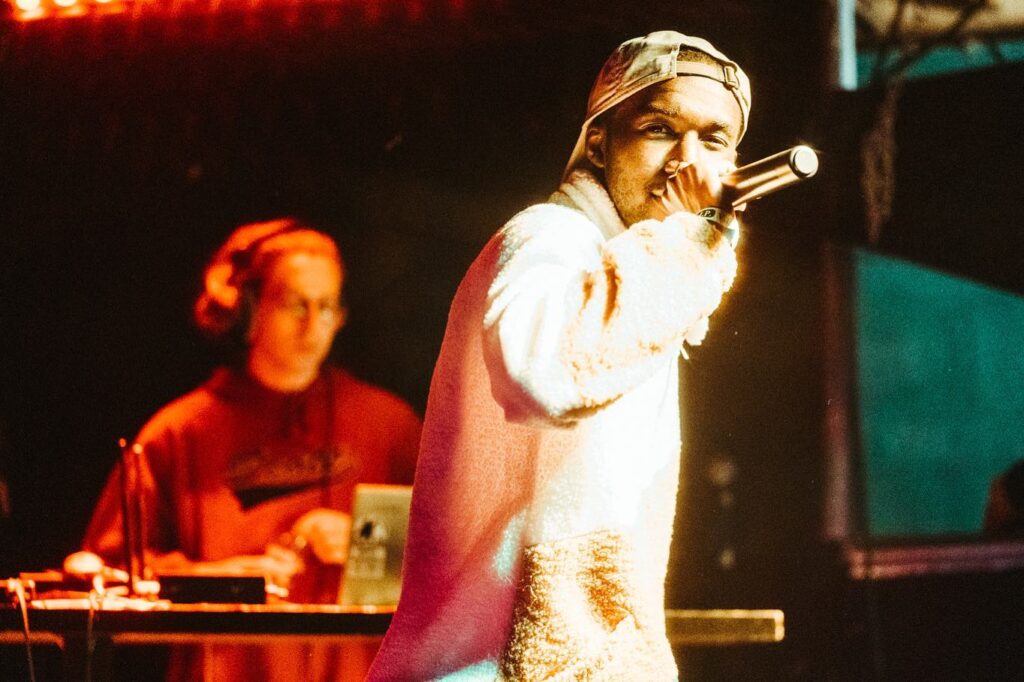
Marissa: Yeah, the lyrics are the part that people are connecting with and singing along to, and you have to build the song around that.
Ahzia: Right, right. Yeah. And like, also understanding that off those initial listens, sometimes people aren’t really listening to the lyrics all that much ’cause they’re just digesting it in real time. But hopefully, if the lyrics are strong enough, you come back on a repeated viewing and you really appreciate what’s being said. You’re like, “Wow, I can jive with that.”
Marissa: Yeah, that’s how I listen at first.
Ahzia: Yeah. Like you pull up the Rap Genius or like the lyric load on your phone and you’re actually following along and you’re like, “Oh.” Yeah, I’ve been doing that a lot lately, just reading people’s lyrics as I listen to the songs, and it does kind of contextualize them in a different…
Marissa: Yeah, yeah. I think my favorite kind of rhyme of yours is the “Could you be less toxic / UPS boxes” lines. I love how many syllables that it matches up from line to line.
Ahzia: Aw, thank you. That’s so- ’cause the rap thing is, like, totally kind of by accident. But I’ve always been a huge literature fan all through school. I loved words and vocabulary. So that’s sometimes like the fun part; how many words can I cram in here. And not just for the sake of doing it, but, to actually drive whatever point I’m trying to get across.
Ahzia: And I remember one guy saying, like, “Man, he’s not gonna fit that word in there,” and then he hears it and he’s like, “Wow! He actually got that word in there.” So, yeah, no, that’s really cool. Thank you.
Marissa: You’re welcome. So do you have any, like, interesting or maybe hidden or unusual sounds in the production of any of your songs?
Ahzia: Um… what’s funny: you did notice the sizzling egg in The Wav..
Marissa: Yeah, that’s a pretty, I think, straight forward reference.
Ahzia: Yeah, yeah, yeah yeah. And you probably caught the whole Sunnyside thing with the egg.
Marissa: Yeah, yeah.
Ahzia: [But to answer your question,] I mean, not really..? There was, like, a beep from a phone in one of them, but that was an accident. That wasn’t intentional. It just was in the background and we didn’t rerecord it. So it’s in there. I’m not going to say what song.
Marissa: I feel like that counts.
Ahzia: Yeah, like a random phone beep, but usually everything’s pretty intentional. Or there’s just, like, something already in the beat. Just run with it, at least with this tape.
Marissa: Yeah. I know in the song, Observatory, you have that recording at the end where you and someone else are talking about the new generation.
Ahzia: Yeah, Joe. Yeah, it was of my barber from my hometown. And it’s so funny because, when I would go there, he would go on tangents about- like gems, though, like talking about life. And he’s up in there in ages- 60s- and he would just go. And one day, I was there, and I was like, “I should record this.” So I just put the voice memo on on my phone. And we kind of were going back and forth very organically, and I kept that for, like, a year, just on my phone. And then I just felt like this is perfect. And I just chopped a chunk out of the conversation- because it’s longer than what made the song.
Ahzia: But it felt very appropriate. And it was at a time with the marching and everything, pandemic-wise. So, yeah, it was nice to be able to encapsulate a lot of those feelings from that time.
Marissa: Yeah, I bet your barber has a lot of interesting things to say.
Ahzia: Oh, yeah. And he’s, like, one of the longest standing black-owned businesses where I come from, as I worked with different business and that’s why using a W2 forms from the same employer was helpful for me. So he’s a big deal. He’s like a staple in the community. Shout out, Joe.
Marissa: Yeah, 100 percent. So how did this album start? Did you make any songs initially that, like, stuck and defined the rest of the album?
Ahzia: Oh, that’s a good question. Um, did any song- one song, kind of inform the tape? I’m trying to think about it, like what are the first couple of songs that got made? I would say… I can’t necessarily pinpoint one specific record, but I did know the album’s title for a long time. I knew ‘nowhere’ was gonna be in the title. And that was from a friend of mine, Mo. We were talking and she was like, “Yo, you’re in the middle of nowhere. Use it to your advantage.” And it stuck with me for years. I think she had said it to me like two years before I even started making the tape and I was like, “You know what? The next thing I do, I’m going to try to weave ‘nowhere’ into it somehow.” And then it kind of became Welcome to Nowhere ’cause I feel like it was kind of an invite into my world. A little bit of my perspective, at least; a greeting.
Ahzia: But yeah, it was more so the title. And then I just started making different songs and seeing how they all kind of came together.
Marissa: Yeah, it’s like “Welcome to Nowhere. Try it out. See what you like.”
Ahzia: Yeah, yeah, yeah! It’s like, music is a sample at the end of the day, you know. I always say that it’s a privilege when you get anybody to listen to something. So people- if it resonates, that’s awesome.
Marissa: On a related note, I’d like to know a little bit more about the cover art for this album. You selected a photo where you’re in a yellow hoodie in front of a projected image of cows.
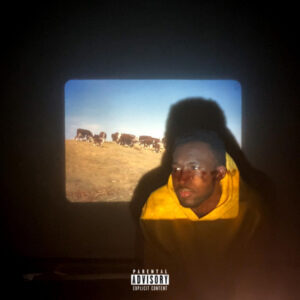
Ahzia: Yeah. Oh yeah. So that was kind of very spontaneous. That was another idea that was pending. My buddy, Logan, had this, like, old-timey projector that I think he got from, like, an auction or a pawnshop. And the projector came with this collection of slides that had already been pre-made. Like whatever family owned the projector had put together these photos. And I was sifting through them and popping them in… had it rigged up in my basement and the cow one just- I was like, “That’s the one.” I don’t know. It was like- it felt very artsy and I wanted people to be like, “What the hell is this?” when they saw it.
Ahzia: I’m a Midwesterner and what better encapsulate the Midwest than an open field with cows? That’s an image you get very familiar with. You hit the road, any direction, and you’re going to see farm and agriculture.
Ahzia: So to have the image on me, it’s almost like a presentation, you know? Like that’s my backdrop, right? If you think about it, you’re standing in front of a class and you’re like, “Hey, like, take a look at this slide.” That is my presentation at the moment. It’s my scenery, my backdrop.
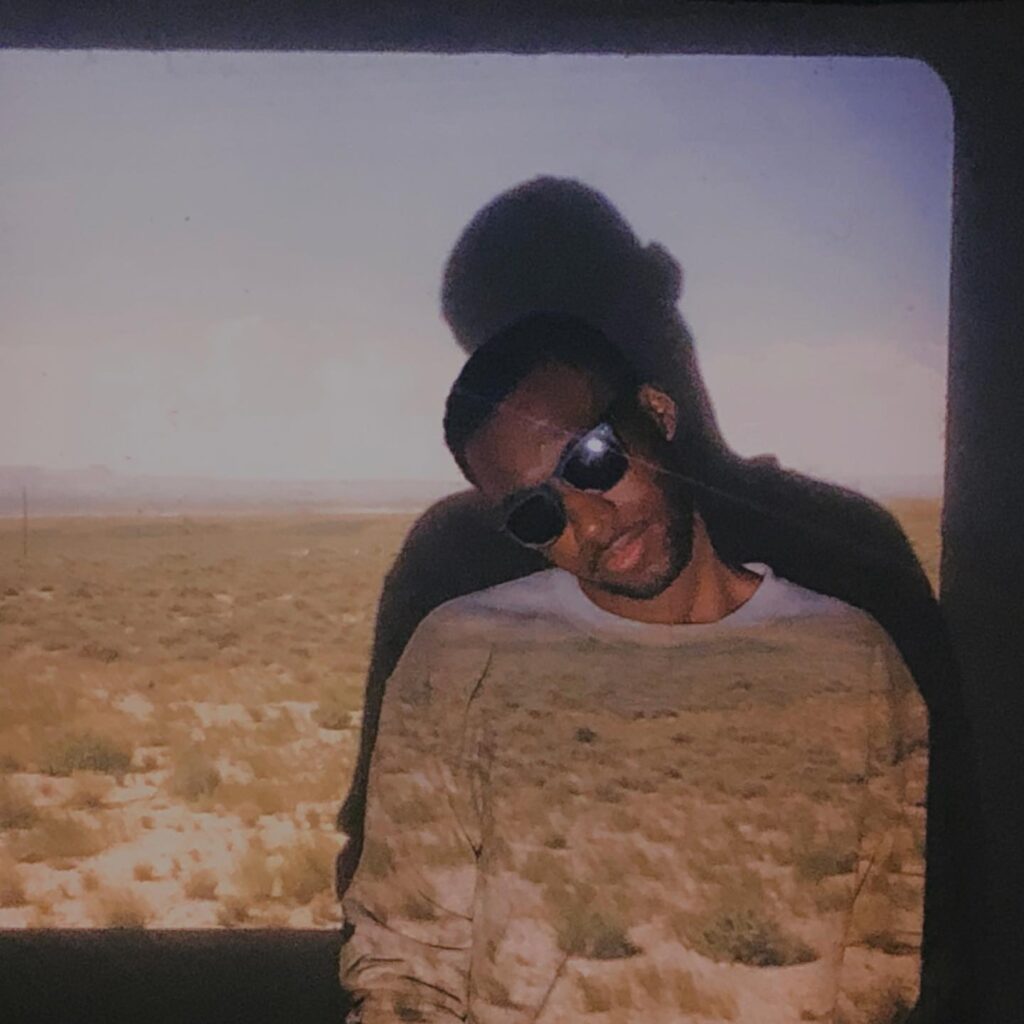
Marissa: I see that. I see that. Yeah, I know in the same photo shoot, there’s a similar picture where the desert is in the background and you’re wearing sunglasses.
Ahzia: Yeah, yeah, yeah. It’s kind of like that barren field. And that picture at one point was, like, a working image, but I was like, “Mmm.” And there was some people that gave me different opinions on it. Like “Oh, it’s cool.” But I was like, “Maybe there’s something a little better.”
Ahzia: And then, like, I did a frame in frame, which, is partly because of my film analysis class; it was just on the brain. I’m like, “I should put a box within a box.” And that’s why the the dimensions are that way.
Marissa: So what’s your favorite part of the song making process? Like, do you like exploring with instruments and chords more or more like the lyrics part of it?
Ahzia: Yeah. I wasn’t always this way, but I’ve really come to learn, like, the puzzle piecing aspect ’cause if you think about- like every piece of art is just like taking an idea and making it into something.
Marissa: Connecting the dots.
Ahzia: Right, right, right. So you have a concept and you’re trying to realize it. So I’ve been very patient with myself in terms of like, “Hey, sometimes you just got to let things cook a little longer.” And I’m really coming to learn to appreciate that part of it because I’m working on some stuff right now. And again, it’s a puzzle piece. It’s like, “Ooh! That works right here,” you know what I mean? And if it fits, you’re like, “That’s where it goes,” and that’s really fun, especially when you start seeing it coming together.
Ahzia: Of course, the other part- I don’t know; the recording can be hit and miss. But the shows are the other part that’s- that is literally why I’m still bothering doing music. You know, I think I would probably make music to some capacity, but when you go and do shows and people are so kind and warm and so generous with their compliments, it’s hard not to put, like, a battery in your back, you know? You’re just like, “Oh, people really do respect the hard work,” and then there’s people have been coming to shows regularly, so shout out.
Marissa: Yeah, I know, like with the pandemic and the ‘no shows’ thing, it was really hard for artists and made them not take that stuff for granted.
Ahzia: Yeah. You know what? That’s such a good point; having that moment where we were deprived of being in groups at that scale. Like you said, you love- I know you were feeling it. I was feeling it. You’re like, “Man, I wanna just be in a crowd of people again.” So I feel like when it did return and it re-emerged, people really weren’t taking it for granted. They’re like, “We know the alternative now.” We gotta appreciate that stuff.
Ahzia: And shows are just so creator to consumer; there’s no buffer. It’s not like sending a link. You’re getting people’s real-time reactions and emotions that the music derives out of them.
Ahzia: So, yeah, I love shows. That is definitely the thing I look forward to doing.
Marissa: Yeah. Everyone was getting very excited in the last song that-
Ahzia: Yeah, they even asked for an encore. I was not expecting that. Luckily, I had a couple songs still on, like, lists we that had- ‘Cause we’re like, “Woah, we’ve gotta chop some of these for time.” And then, yeah, [the Mission Creek Staff] gave me the Okay to do it. So that was awesome. That was a fun way to end it.
Marissa: Yeah, yeah, I had fun on that song too. People we moshing.
Ahzia: Yes. Yeah, I was like, “Rise, jump.”
Marissa: Yeah, yeah. So, I know in the past you’ve been featured on other people’s songs and I know on READY.SET.GO and on this album, you have a couple of features. So how has the song making process changed when working with others? What have you learned from working with others when making songs?
Ahzia: Oh gosh, that’s a great question. I am one of those people where I don’t have a ton of collabs to my name, not because I don’t like collabing. I think it just comes down to like, you being on the same frequency as someone and, like, wanting to make something that resonates with both of you. And I found that the most efficient collabs- like, the most recent one I did was Mota with my buddy Evan-
EJ is his artist name- He dropped a tape a few weeks after I did, so it was really nice to team up in that way. When someone shows up and has an idea already in motion, then I can try to compliment it versus someone just being like, “Let’s make heat.” And you’re like, “We don’t have a beat, we don’t have lyrics, don’t I have a concept like-” I’m more of a “Let’s have a template of some kind and work within those parameters,” because if I know what you’re after, I’m probably gonna give you a performance you’re happier with. As opposed to just throwing straight at the wall, which works for some people, but time management- I’m, like, in school and stuff, so I only have so much time to do art. And yeah, it’s like a rubric. It’s like, “Give me- what are we tryna-“
Marissa: More structure, guidance.
Ahzia: Yeah, yes, it’s it’s like, ‘What’s our art syllabus?’ you know what I mean? Like, what are the expectations, what’s the direction for this so we can make the best thing? It doesn’t even have to come out. But-
Marissa: Is that what it was like when you were working with your recorder, Ryan Radig, and your producer, Pilot Kid, and your mixing and mastering guy, Travis Harms–
Ahzia: Yeah. So yeah, I mean, I think I always knew the tracklist was going to be around nine songs. Just realistically budget wise, I was like, “Okay, I can probably give a good nine,” you know. I didn’t want- You know how sometimes you get those bloated-ass albums with, like, twenty-five tracks and you’re like, “Yo, you couldn’t have cut some of these? Like you needed to give us all of these?”
Marissa: The deluxe version.
Ahzia: You know, everyone has their different approach, but I felt like nine- especially being an artist that isn’t popular or isn’t known- nine is a probably smaller ask. Nine tracks clocks in at, like, 25 minutes; that’s a car ride in most cases, so it might be a little easier to pitch.
Ahzia: Yeah. And we just, like, again, I would find beats, I would lock in. I would try to see what type of feelings it elicited, and then I’d bring it to Ryan and we would start recording. And sure enough, we would start cranking out songs.
Ahzia: I think all the endorphins are hitting me because this usually feels weird, like talking about my own content. But yeah, you made a good call, post-show, like-
Marissa: Yeah, I mean I couldn’t find a lot of interviews with you online either, so, I’m like-
Ahzia: No, yeah, I’ve done, like, written ones, but not really recordings so much. So this is cool.
Marissa: Yeah. Okay, good. So my next question: None of the Welcome to Nowhere songs have a music video.
Ahzia: Mmmmmmm. This is controversial. I don’t even know if I should say this one on record ’cause then I’m gonna- If I say it, I don’t wanna be held accountable to do it.
Marissa: No pressure.
Ahzia: Can I not say? ‘Cause I do have some things that were… We have some songs picked out. I’ll say that. There’s some visuals coming. And honestly, I kind of purposely tried to wait ’cause I wanted to gauge what people liked and then see if that jives with what my tastes are at and then make a video based on that.
Marissa: Yeah, I never thought about it that way where you gauge based on-
Ahzia: Yeah, I mean I get the traditional kind of, like- you have a single already planned and that’s the one you run with and you work that promo on it. But I’m like ‘eh.’ I mean- and that’s a way to do it, too- but I thought, ‘Eh, I want to get the tape out.’ That was priority one, and I wanted people to hear it in its entirety.
Ahzia: So now that it has made its rounds a little bit, I’m interested in dialing in on a couple of records and giving them a little more shine. I’ll say that.
Marissa: So now we’re going to pivot a little bit with the questions. We’re gonna talk more about your past. So what was cathartic about writing READY.SET.GO? I know you said that in the past that this tape was the product of a lot of late night cruises through town and some very uncomfortable realizations.
Ahzia: Yeah, it’s just- Maybe it’s not that profound, but it’s just being a twenty-something and trying to figure out what in the hell am I supposed to do with my life? And you get out of high school and you start to realize that it’s on you. You know, no one’s going to force you to be anything in life.
Ahzia: And I found that getting my first car was a real milestone moment ’cause I was walking to work for a little bit and that’s not fun. And I’ve taken the bus system. And naturally, there’s a certain level of liberation that comes from having a car. And I was kind of just thinking like, “If I’m in the driver’s seat, you know, figuratively or literally, what are the kind of things that make me tick,” you know? And that’s again, just like confrontation with self and like really asking yourself uncomfortable questions and just trying to get to the root of stuff. So, it was kind of like a mirror tape. And that’s when I really felt like I hit a groove. And then, of course, the tracklist is different car-related things and stuff.
Marissa: Yeah, like the keys and the beeping-
Ahzia: Yeah, the gear, and the- yeah.
MarissA: So, I saw from your Instagram that you saw Childish Gambino in 2018.
Ahzia: I did. Oh my gosh.
Marissa: Yeah, what an experience. Do you have any treasured memories from that night?
Ahzia: Did you see him live?
Marissa: No, I’ve never seen him live.
Ahzia: Oh my gosh, let me tell you something. I gotta give people their flowers. Because The Internet is my most listened to album of all time.
Ahzia: The amount of times that I’ve listened to that album- I listen to that album like it just came out. It’s one of those tapes that just clicked for me. I love it front to back. I think it’s such a relevant piece of hip hop. It’s got a cult following. That was when Bino really was starting to transition and start Donald’s in so many mediums.
Ahzia: That’s another reason why I have so much admiration for him. It’s not even just a musical tidbit. He just flexes in every avenue he’s in. He’s doing it at a high level. And who wouldn’t appreciate that, you know?
Marissa: Yeah, doesn’t he have his own TV show?
Ahzia: Yeah, he’s got a show. He’s starred in multiple things. He’s done standup. He’s a writer. He’s a performer. He sings- I’m like, “Man, he is just entertainment excellence, you know?”
Marissa: Yeah, well rounded.
Ahzia: Yeah, not everyone can do that. And I think, “That takes a lot of bravery to put yourself out there in all those different ways.” And I hope I can get to that point one day; that’d be awesome. But yeah, no, he’s incredible.
Ahzia: And that was also, like, supposedly his last tour. Now, maybe that will be subject to change, but at the time that he made that tour, he said that was his last. So, I’m like, “Well, I’m not missing it.” Like, I made it my business- I went by myself; that’s how serious I was. I had a friend that was gonna go, couldn’t go, so I was like, “All right, that’s fine. I’m going.” Like, it was a non-negotiable for me.
Marissa: Yeah, when an artist means that much to you…
Ahzia: Oh my gosh, yeah. And I haven’t even gone to that many concerts, to be completely honest. But that was one of those ones that just felt like, I shouldn’t miss this. And it was lovely. It was in Chicago at the United Center.
Marissa: Yeah. I recently went to a concert in Chicago for a band that I feel like is about to explode. They’re called Inhaler. They’re indie rock.
Ahzia: Oh, right on. Isn’t that such a good feeling to you? When you feel like you’ve spotted it in someone? Because I remember when Bino was, like, relatively bubbling. But then next thing you know, jump a few years and he’s headlining Coachella and you’re like, “I knew it. I was right.” I knew he had it! I knew, like, whatever that It thing is, he has it. And it feels really good as a fan when you feel like he represents you; when you see them continue to grow. It’s a piece of you.
Marissa: Yeah, yeah. So how do you think a generic rap album differs from a good one? I know for you personally, your music is known for having melodic production and clever lyrics.
Ahzia: Sure. I was just thinking about this a lot. I’m one of those geeky- I geek out on albums! Like I’ve been buying a lot of viny, and my one requirement to get a vinyl is- I need to like at least 80 percent of the album. If I only like one song, I’m not gonna shell out 30/40 dollars for a vinyl. It’s got to be a great body of work, which, in this day and age, I don’t know how important that is to everyone. And the industry doesn’t necessarily make it all that important either. But I think that the guys that really hang around, whether it be Kanye, Kendrick, Gambino, or Tyler- those are some of the people that come to mind for me- they make bodies of work that you can really sit in and they feel intentional. And I think that’s really, what to me, distinguishes a great album from just like a generic art project. Generic ones don’t feel intentional; it just feels like maybe, perhaps they just had a bunch of songs and they threw it on a project. You know what I mean? Like, “Here’s a bunch of songs; I put ’em on track list; here you go,’ versus, “No, no, no, no. I want you to hit play on the first song and let it go all the way through at least once.” And then if you want to take a couple and put them on your playlist, fine, but at least just hear the whole thing in itself.
Ahzia: And I think that shows a fan’s respect for you. Like a fan respects you enough when they do that ’cause you’re not- and I’m sure you can speak to that- you’re not trying to sit and listen to everyone’s album, you know what I mean? Like, there’s certain artists that when they drop an album, day one for you, that you’re like, “Oh, I gotta- I need that in my ears. I need to see what they’re up to.” And that’s usually because you trust them from a vision standpoint. You feel like, “Okay, they’re going to take me somewhere.”
Marissa: Yeah, yeah, like a whole experience.
Ahzia: Yes. Putting people in an atmosphere.
Marissa: Yeah. So I know you have said that you had an early interest in illustration and writing and theater, all of which lend themselves to being a music artist. So how did those skills or interests translate to your career?
Ahzia: Oh my gosh. Literally, I’m- this is just me giving a shout out to everyone- Literally, I would not be doing music had I not did theater. That was my gate. And I didn’t even mean to do theater. It was actually an accident.
Ahzia: Yeah, so I was in speech in high school and my speech teacher, Mrs. La Corte, shout out Mrs. La Corte, she- I owe her money. I do; I’m being dead serious, like I owe her some cash, so I’m trying to get myself right, so I can repay her ’cause I don’t think she understands the full weight of what she did for me. She really validated me at a time when I needed to be validated, and she was the person that nudged me to get into drama. She’s like, “Dude, you need to be performing. You need to utilize your ability to convey ideas.” ‘Cause I was doing very well in class and she pestered me until she gave me a role in the musical. I tried to skip out on the the audition and she just found me after and still gave it to me.
Ahzia: So at that point, I felt like I had to do it. But just being in that space, learning show etiquette, memorizing lines- that’s a big thing- You notice, like with my show earlier, I have, like, little hook vocals, but when it comes to rapping, I’m rapping. So if I stop- if I forget my lines, just know you’re not going to hear anything.
Ahzia: And I think that should be the standard. You know, people come to see you perform, and maybe that’s just, again, me doing theater where line memorization is such a big part of that. You don’t get a script on show day, you know? You better be ready to convey the ideas.
Ahzia: So, yeah. Theatre was big. Show choir, too; that’s on the low. You’re getting some scoops here. Like again: showmanship and stage presence…
Marissa: Yeah, yeah. What goes into preparing for the live show and developing your stage presence? Like you have to be pretty brave to put yourself out there, just you on stage. And it’s kind of intimate.
Ahzia: Yeah, It is kind of crazy when you think about it. You know what I think: when they say that the biggest phobia is public speaking, like the biggest fear for most people- you’re so vulnerable and you’re being judged actively. And people are getting the opportunity to feel however they feel about you. And I think the only way you can really protect yourself is the material. ‘Cause if you go up there and you’re actually performing something you really believe in and care about, it makes helps you get lost a little more. So I always say, like at the very least, my one condition is to make music that actually speaks to what I want to say. Tell the truth, you know?
Marissa: Yeah, you can’t really be sorry for doing what you love.
Ahzia: Yeah, it’s like, “Yo, if you’re being your authentic self and someone still doesn’t like you, then that’s just what it is.” You can’t do anything about it. And that’s another thing; I think a lot about how we struggle with wanting to be liked by people and validated by the wrong people, and people will kind of redo their entire identities to try to accommodate people. It’s just reality, especially in our age group, but you got to find out what you’re willing to give and what you’re not. You know, some things are just like, “This is intrinsically me, and if you don’t like it, that’s fine.” You know, art is subjective. And at the end of the day, people are allowed to not like things, but I like what I’m doing and I’m making stuff that is based on the stuff that I’m a fan of.
Marissa: Yeah. Part of growing up, you know?
Ahzia: Yup. Yeah, like being twenty-five now, I feel so relieved, you know? I feel less of that social pressure to perform in that space. I just need to be me. You know, life’s too short.
Marissa: Yeah, yeah. Have you ever had any shows where you were dreading it, but then once you did it, you just felt amazing? Like maybe the time when you were in California for the Bless the Mic Showcase?
Ahzia: That was not good. That show’s trash, by the way. It was just a hole in the wall. It was in L.A. and I know the perception- of course, people were so hype from the Instagram posts; I’m sure you probably saw; it was like hella comments- but it was only because I was in L.A. We’ve done better shows here in Iowa. Easy. The people that I’ve worked with here are some top notch artists.
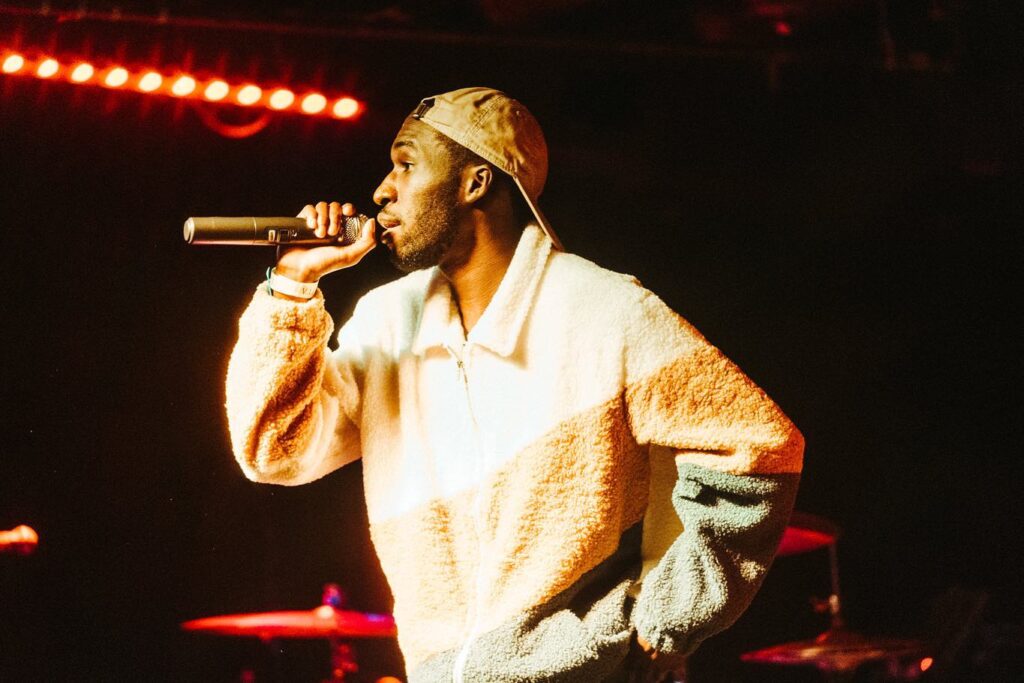
Ahzia: And that was a lot of it, was just the kind of demystification, right? Like just because it’s Cali, in L.A., it does not mean it’s good.
Ahzia: And that was not a good thing. That show was kind of weak. I mean, I was hyped to do it; I went in optimistic, but in retrospect, I’m like, “It wasn’t all that.” And it was a pay-to-play show, too. So we had to pay just to be there. So it was just a payday for these guys, like we’re just in some random bar.
Marissa: Yeah. I mean, I feel like all artists have that show.
Ahzia: Yes, you have to have those shows. Builds character. I’ve had people literally talking over my set, like with their back to the stage and I’m like, “Yo, it is what it is. We’re just here to entertain, folks.” I don’t take it too personally. And it actually makes me want to go harder ’cause then you’re like, “Alright, tryna act like I’m not going crazy over here. I’m ’bout to bar out. Like okay, let me show you something.”
Marissa: Do you have anything in mind to make your shows bigger or have a bigger production? Like currently right now, you’re rapping over a backtrack and-
Ahzia: Oh my gosh, yo- Legit? That’s so funny you should say that because there are some band guys that I’m homies with and we’ve been discussing getting a band together for some shows and trying that out. And I think the music lends itself well. There’s a lot of instrumentation already in it.
Marissa: Yeah, like live drums?
Ahzia: Yeah, like live guitars and drums and keys. So I think that would be really cool. So we’re gonna book out some rehearsals. ‘Cause the thing about live shows with bands is that you guys have to really be synchronized. Because if someone’s off, it would be disastrous. So I’m not in a terrible rush to do it just because I want everyone to feel good about what we’re doing and play to the best of their ability. But I do think that would be a great way to elevate a show.
Ahzia: I also really just want to get to a point where I can start doing backdrops and crazy lights ’cause that stuff does play into it, right? When I go to concerts, the lights and the way they’re synced with the music and all that stuff plays into the show. We just gotta get some more clout to the name, you know?
Marissa: I saw you added a back screen visual at your performance at Gabe’s a couple weeks ago.
Ahzia: Yeah. So that was thanks to Avery, who had a friend from Looper Studios- everyone’s getting plugs. I believe they’re in Iowa City, maybe Coralville, somewhere in this area and they’re pay-to-hire; they will run cool visuals for your event. And it’s like $250 a show. And they got them to do it. It was really neat. I lov- he had it synced with the music and stuff playing; he was essentially performing with artists… but performing on visuals. I wish that was actually at the venue all the time.
Marissa: Sure. Okay, so with the internet, the rise in the streaming medium, and the accessibilty of inexpensive home studios, artists are going independent more than ever before. Like why give away your creative freedom and a majority of your earnings to these big studios if you don’t have to?
Ahzia: Oh my gosh, yeah.
Marissa: So like when Tyler, the Creator, was beginnng, he caught on to this trend early and rejected a lot of lucrative record deals-
Ahzia: Yeah, he got that Odd Future deal-
Marissa: Yeah, in favor of like a more organic rise to fame and complete creative control. Do you have any interesting thoughts about this topic?
Ahzia: Ooh! I don’t want to keep you here all night, but I will say this; I’ll try to be as condensed about it as I can.
Ahzia: Intention. Why are you trying to get into music? ‘Cause some people really do go to a label saying, “I just want to be famous,” you know what I mean? “I want to be the biggest, highest streamed, most-Make me the biggest product you can make me. You can take my music. You can package around me as you see fit. Just get me there. I want the status more so than anything.” And that’s not to say those people don’t love music; they’re just very much willing to be in the machine. And not everybody even gets that, especially when you’re negotiating on a label,
Ahzia: And then you have other people- they’re like, “Hey, I have a very particular vision and I don’t want my voice to be manipulated and I want enough respect from my collaborators,” ’cause they’re giving you money to make this stuff, right? And at the end of day, no label’s in the business and not making money. Like they want you to be a profitable thing for them, so that can determine- if you prove, like as Tyler has, that you’re consistent and you keep growing- he can kind of do whatever he wants, I’m sure at this point, maybe even more so than he did initially, just because he’s good for it. He’s like, “Yo. My fans- I’m tapped in and I know what I’m doing.” And some people need a little more development. So it’s so kind of case by case.
Ahzia: But I will say personally that if I ever found myself in a situation where somebody wanted to negotiate taking my art ’cause you’re giving away your masters in a lot of cases… almost all cases… I just want them to really get, you know what I mean? I want them to- They would really need to make it clear that they understand what Ahzia is. And I’m acting like I have a clear idea, but… it’s gotta feel human.
Ahzia: You know, they- they have to care about the artist because look how many young artists we’ve had pass away in the last five years. And then they’re making all these posthumous albums of dead artists and you’re just like, “That’s kind of weird.” They have no say in it. I don’t know what’s going on with these estates and stuff, but again, you just want to know that the people around you care about you. So, yeah, I mean, I think everyone’s got to make the decision for themselves. But they should just make sure that they’ve got the right kind of people around them; that are going to advocate for their best interests and not just pimp ’em out.
Marissa: Yeah, yeah. Alright. Well, last question. So what is the importance of formal music training for a musician?
Ahzia: Mm. I have none, so I am not probably the most qualified person to speak on this, which is something I do want to do more of. That’s funny you should say that like I just wanna have a better understanding of chords. I think it just ultimately- it just helps you articulate what you want, right? The more you understand the music and how it’s made, the more you can get there I would think. That just makes sense, right? Like, I mean… there’s a lot of people that don’t have formal training that are making really incredible records. But I do think the edge that you do get from having an understanding of instrument and in music theory and everything that comes of that- you’re probably just accelerating the process. It’s a discipline at that point. So you know the hacks and you know the little templates, so you can get to that product a bit quicker than someone that has no idea.
Ahzia: You know, it’s kind of like how many rappers are fighting the beat. And if you don’t know what that means, it means they’re not on beat. And you’re like, “Yo, there’s pockets you’re supposed to rap within and that’s gonna help you flow.” That’s, you know, cadence and all that stuff. So even in rap, there’s certain tools and principles that people can use to make better music.
Marissa: Yeah. Yeah. You don’t want to rush or drag or anything.
Ahzia: Yeah, you don’t want to be falling behind the beat ’cause then it’s like, “What’s going on?” I mean, there’s sometimes a stylistically- sometimes people just don’t understand that they need to chop some words off their verse to make it actually make it fit properly or add words. And that just comes with experience, like most things. Yeah, like experience creates confidence.
Marissa: Yeah. Okay, well, that’s the end of the interview. I just want to congratulate you on the album and your performance and everything, and I would like to thank you for your time for interviewing with me.
Ahzia: Yeah, thank you, really.

